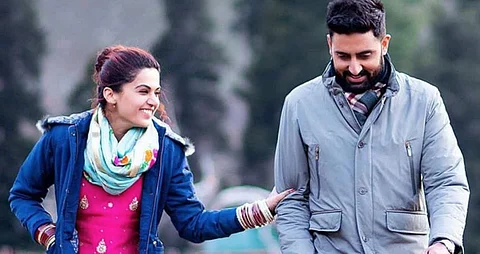

Taapsee Pannu as Rumi sports a mop of auburn-red curly hair. In the middle of a rant about marrying her off to someone good enough, Rumi’s aunt mentions her hair and its colour. It is small details like this that make Manmarziyaan so relatable. The subtlety with which it captures the everyday, run-of-the-mill commentary unmarried and married women listen to. It does not do this in a showy or deliberate manner but it simply turns the volume up. By amplifying the voices around the woman, it makes it easy for the audience to put themselves in her shoes. By placing Rumi at the heart of the film, it shows us what it’s like to be a certain kind of modern woman.
Taapsee first piqued my interest when she starred in a small but highly memorable role in Baby. Then I saw the spin-off for that small role, in Naam Shabana. The sincerity she brought to her roles stood out on both occasions. She looked earnest doing what she did. Like she meant business. Anurag Kashyap and Kanika Dhillon seem to have tuned right into that ‘means business’ spirit of Taapsee by casting her in this role. That and by taking her ability to perform ‘physically’ (she had ‘stunt’ bits in both Baby and Naam Shabana) and channelling all that energy into something different. Taapsee is so effervescent, her presence so solid, that in some of the scenes if you reached out, you could almost touch her on screen. But Rumi isn’t your ‘bubbly’ girl at all. She’s anything but. There is nothing cutesy about her (thankfully). She walks, talks and loves like she means business. Having lost her parents at a young age she is not bound to the family she’s living with in the ways a young woman is to her parents. This translates to her ability to come and go as she pleases, speak her mind and even have her boyfriend over or dance at a wedding. Her aunt stops her own daughter from dancing while Rumi is allowed to with no fuss.
Vicky, the man she’s seeing (Vicky Kaushal upon whom you can depend to deliver any kind of role it seems), does not want to be tethered to anyone just yet. He is unsure about everything except his ‘fyaar’ for Rumi. When the duo is ‘caught’ at home and when Vicky fails to show up, Rumi’s nonchalance and anger, respectively, are perfectly placed. When the ‘arranged marriage prospect’ Robbie (Abishek Bachchan) enters, things go from fun to really interesting. Abhishek too is superbly cast in a role that seems almost written for him, taking his immense screen presence into account. When Rumi appears on the terrace where he’s drinking, Robbie merely needs to nod to send his cook with whom he’s drinking, away. When he follows Rumi to Vicky’s home and discovers he’s been (spoiler alert) cheated on, he drinks and loses his cool a little and then tears up. The former is entirely uncharacteristic. The next morning, he promptly apologises and readily walks out of the marriage.
On the day she of her wedding, when Rumi’s grandfather asks her if she’s okay, she tells him something to the effect of, “My previous love hasn’t even come to a proper end yet and I am already married. We’ll see…” This is just one of the many times she speaks her mind. Rumi’s powerful, in this film, not because she can beat men up (she does lift weights and is a former hockey player) but from her ability to advocate for herself and speak her thoughts, clearly.
The chemistry between Rumi and Robbie is fantastic and precious, given how shy the latter is and how physical Rumi and Vicky are in their scenes together. Anurag and Kanika convince us of Rumi’s genuine confusion. It could have easily slipped into any of the red flag territories--showing one or all three as sleazy, as immoral, as cowardly--but the film does none of that. Instead it showcases what makes us all human – guilt, vacillation, love, frustration and anger. With a steady hand from the first frame, Anurag and Kanika show us what assured filmmaking, backed by great writing can do. This duo is so good that when the film got over after a heartwarming walk and conversation between Rumi and Robbie, I found myself thinking, I could watch some more of this and quickly made plans to re-watch it. Though Kanika uses modern tier-2 town India to further her story (Vicky and Rumi meet on Tinder and Robbie stalks her on Facebook), I found the basics of her writing to be classical in nature – almost Austen-sque. The author punishes her characters each for their own flaws, and when they prove themselves, they each get the endings they deserve. Robbie has always been ready for marriage, but despite knowing that Rumi’s affections are elsewhere throws his hat in the mix, Vicky isn’t ‘adulting’ all that well at all and is constantly not turning up, embarrassing and frustrating Rumi, and Rumi is torn and ends up cheating despite Robbie telling her to walk away if she wants to. Each pays the price for their transgressions. And then comes the classic ending.